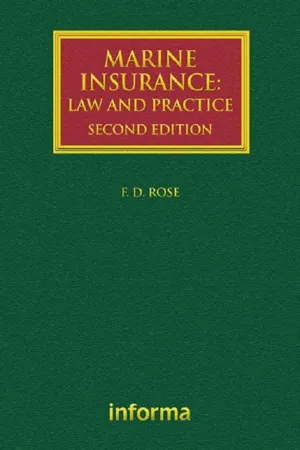
- 958 pages
- English
- ePUB (mobile friendly)
- Available on iOS & Android
About this book
Marine Insurance: Law and Practice, Second Edition, continues to provide the most comprehensive and integrated account of the English law and practice of marine insurance. It provides readers with a fresh and up-to-date review of the modern law in the light of traditional principles and rules of underlying commercial law, and the specific statutory rules of marine insurance as interpreted by case law, as moderated in practice by market practices and standard form marine insurance clauses. Francis Rose clarifies the law's underlying framework of principles and illustrates how it works in common contractual situations, explaining how the different components of the law interact.
The new edition has been updated to incorporate:
• the most recent case law: there have been some very important judgments handed down since the book first published, including: The Cendor MOP, The Silva, The Resolute and The Marina Iris
• the implications of the introduction of: Institute Cargo Clauses 2009, the effect of the Gambling Act 2005 and the Third Parties (Rights Against Insurers) Act 2010 Law Commission reform proposals
The book explores in detail the following areas:
• the nature of insurance
• insurable interest
• the insurance contract
• the premium
• insured risks
• marine risks
• exclusions
• losses
• claims
• subrogation
• double insurance
Frequently asked questions
- Essential is ideal for learners and professionals who enjoy exploring a wide range of subjects. Access the Essential Library with 800,000+ trusted titles and best-sellers across business, personal growth, and the humanities. Includes unlimited reading time and Standard Read Aloud voice.
- Complete: Perfect for advanced learners and researchers needing full, unrestricted access. Unlock 1.4M+ books across hundreds of subjects, including academic and specialized titles. The Complete Plan also includes advanced features like Premium Read Aloud and Research Assistant.
Please note we cannot support devices running on iOS 13 and Android 7 or earlier. Learn more about using the app.
Information
CHAPTER 1
THE NATURE OF MARINE INSURANCE 1
I INTRODUCTION
Table of contents
- Cover Page
- Half Title page
- Title Page
- Copyright Page
- Dedication
- Foreword
- Preface
- Contents
- Table of cases
- Table of Legislation
- Table of Standard Form Clauses and Rules
- Table of Abbreviations
- The Nature of Marine Insurance1
- The Subject Matter of Insurance
- Insurable Interest
- Intermediaries
- Presentation of the Risk and Good Faith
- The Contract
- Parties
- The Premium
- Terms of the Contract1
- Period of Cover
- Departure from Cover
- Varying Cover
- Insured Risks
- Marine Risks
- Inchmaree Risks
- Liabilities
- Discord (“War and Strikes”) Risks
- Exclusions
- Causation
- Aversion and Minimisation of Loss1
- Losses
- Partial Losses
- Total Loss
- Abandonment
- Quantifying the Indemnity1
- Claims
- Subrogation and Recoupment
- Double Insurance and Contribution
- Appendices Appendix 1 Marine Insurance Act 1906
- Appendix 2 Marine Insurance (Gambling Policies) ACT 1909
- Appendix 3 Third Parties (Rights Against Insurers) Act 1930
- Appendix 4 Marine and Aviation Insurance (War Risks) Act 1952
- Appendix 5 Third Parties (Rights Against Insurers) Act 2010
- Appendix 6 Consumer Insurance (Disclosure and Representations) Act 2012
- Appendix 7 Lloyd's Marine Policy (Mar 91)
- Appendix 8 The International Underwriting Association (Iua) Marine Policy
- Appendix 9 Institute Cargo Clauses (A) (1/1/82)
- Appendix 10 Institute Cargo Clauses (A) (1/1/09)
- Appendix 11 Institute Cargo Clauses (B) (1/1/82)
- Appendix 12 Institute Cargo Clauses (B) (1/1/09)
- Appendix 13 Institute Cargo Clauses (C) (1/1/82)
- Appendix 14 Institute Cargo Clauses (C) (1/1/09)
- Appendix 15 Institute Time Clauses (Hulls) (1/10/83)
- Appendix 16 Institute Time Clauses (Hulls) (1/11/95)
- Appendix 17 International Hull Clauses (1/11/03)
- Appendix 18 Institute Voyage Clauses (Hulls) (1/10/83)
- Appendix 19 Institute Voyage Clauses (Hulls) (1/11/95)
- Appendix 20 Institute Time Clauses (Freight) (1/10/83)
- Appendix 21 Institute Time Clauses (Freight) (1/11/95)
- Appendix 22 Institute Voyage Clauses (Freight) (1/10/83)
- Appendix 23 Institute Voyage Clauses (Freight) (1/11/95)
- Appendix 24 Institute War Clauses (Cargo) (1/1/82)
- Appendix 25 Institute War Clauses (Cargo) (1/1/09)
- Appendix 26 Institute Strikes Clauses (Cargo) (1/1/82)
- Appendix 27 Institute Strikes Clauses (Cargo) (1/1/09)
- Appendix 28 Institute War and Strikes Clauses (Hulls—Time) (1/10/83)
- Appendix 29 Institute War and Strikes Clauses (Hulls‒Time) (1/11/95)
- Appendix 30 Institute War and Strikes Clauses (Hulls—Voyage) (1/10/83)
- Appendix 31 Institute War and Strikes Clauses (Hulls—Voyage) (1/11/95)
- Appendix 32 Institute War and Strikes Clauses (Freight—Time) (1/10/83)
- Appendix 33 Institute War and Strikes Clauses (Freight—Time) (1/11/95)
- Appendix 34 Institute War and Strikes Clauses (Freight—Voyage) (1/10/83)
- Appendix 35 Institute War And Strikes Clauses (Freight—Voyage) (1/11/95)
- Index